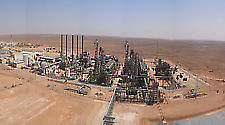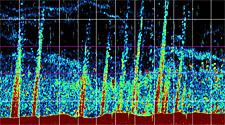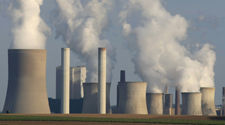|
|
|
|
Quintessa
is helping to address major challenges to the continued use of
carbon-based fuels, including the geological storage of greenhouse gases
and natural gas, through its
decision support,
geosciences,
mathematical modelling
and
systems assessment
services.
|
|
|
|
|
|
|
|
|
|
|
|
Scenarios for Potential Impacts from Hypothetical Leakage from CO2 Geological Storage Facilities
 As a contribution to the European
RISCS
project, Quintessa staff have authored a report on scenarios for potential impacts that might be caused by hypothetical carbon dioxide leakage from geological storage facilities.
As a contribution to the European
RISCS
project, Quintessa staff have authored a report on scenarios for potential impacts that might be caused by hypothetical carbon dioxide leakage from geological storage facilities.
The RISCS project is running for 4 years (2010 - 2014) and is supported by the European Commission and a number of industrial partners. The project aims to improve understanding of how geological CO2 storage might possibly impact upon the environment. There are 24 participating organisations, including...
Full Details
|
|
|
|
|
|
|
|
|
|
|
|
TESLA 2.1 Released
 A major update of Quintessa's decision support software
(TESLA
Version 2.1) has been released incorporating a host of new features designed to make it easier to analyse, present and audit decisions.
A major update of Quintessa's decision support software
(TESLA
Version 2.1) has been released incorporating a host of new features designed to make it easier to analyse, present and audit decisions.
TESLA
is a software tool that supports the structured analysis of complex decisions using an approach founded on Evidence Support Logic
(ESL). This approach has proved invaluable to decision makers faced with complex problems drawing on multiple and uncertain sources of evidence, such as encountered at the back end of...
Full Details
|
|
|
|
|
|
|
|
|
|
|
|
CO2ReMoVe Closing Conference
 The closing conference of CO2ReMoVe, an EU project on CO2
storage, was held in Paris on the 29th February 2012. The six-year
project involved over 30 partners from research and industry
organisations in Europe and beyond. A key conclusion is that results
from all the sites indicate that underground CO2 storage can be carried
out safely, with CO2 effectively contained in all storage projects
studied. Operational irregularities, such as a small leakage from an old
well, have not led to concerns about storage safety or permanence.
Full Details
The closing conference of CO2ReMoVe, an EU project on CO2
storage, was held in Paris on the 29th February 2012. The six-year
project involved over 30 partners from research and industry
organisations in Europe and beyond. A key conclusion is that results
from all the sites indicate that underground CO2 storage can be carried
out safely, with CO2 effectively contained in all storage projects
studied. Operational irregularities, such as a small leakage from an old
well, have not led to concerns about storage safety or permanence.
Full Details
|
|
|
|
|
|
|
|
|
|
|
|
United Nations Framework Convention on Climate Change Workshop
 Richard Metcalfe gave an invited presentation on risk
assessment for CO2 storage projects, at a technical workshop on Carbon
Capture and Storage (CCS) that was held in Abu Dhabi on 7-8 September
2011.The meeting was convened by the United Nations Framework Convention
on Climate Change (UNFCCC) and co-sponsored by the governments of
Norway and the United Arab Emirates. The purpose of the workshop was to
discuss "Modalities and procedures for CCS in geological formations as
Clean Development Mechanism (CDM) project activities", specifically to
provide technical input to negotiations about whether or not CCS should
be adopted as a...
Full Details
Richard Metcalfe gave an invited presentation on risk
assessment for CO2 storage projects, at a technical workshop on Carbon
Capture and Storage (CCS) that was held in Abu Dhabi on 7-8 September
2011.The meeting was convened by the United Nations Framework Convention
on Climate Change (UNFCCC) and co-sponsored by the governments of
Norway and the United Arab Emirates. The purpose of the workshop was to
discuss "Modalities and procedures for CCS in geological formations as
Clean Development Mechanism (CDM) project activities", specifically to
provide technical input to negotiations about whether or not CCS should
be adopted as a...
Full Details
|
|
|
|
|
|
|
|
|
|
|
|
Methane Release from Warming-induced Hydrate Dissociation
 Kate Thatcher is the lead author on a paper ‘Methane release
from warming-induced hydrate dissociation in the West Svalbard
continental margin: Timing, rates, and geological controls’ that has
been published in the Journal of Geophysical Research.
Kate Thatcher is the lead author on a paper ‘Methane release
from warming-induced hydrate dissociation in the West Svalbard
continental margin: Timing, rates, and geological controls’ that has
been published in the Journal of Geophysical Research.
Hundreds of plumes of methane bubbles emanate from an area of
the seabed off West Svalbard that has become 1°C warmer over the last 30
years. The paper investigates the hypothesis that the methane in the
plumes is derived from hydrate dissociated by ocean warming. Numerical
models were used to simulate the response...
Full Details
|
|
|
|
|
|
|
|
|
|
|
|
International Conference on Greenhouse Gas Technologies (GHGT-11)
 Richard Metcalfe, Alan Paulley and Hiroyasu Takase of Quintessa participated in the
GHGT-11
conference on greenhouse gas technologies held in Kyoto, Japan
between 18th and 22nd November 2012. They made presentations covering
the wide range of Quintessa's activities in the field of Carbon Capture
and Storage (CCS), including results from projects concerning:
structured scenario development to support Performance Assessment of CO2
storage; decision-making during site screening and performance
assessment; fully-coupled systems-level modelling of CO2 storage; fully
coupled modelling of impacts from hypothetical CO2 leakage; and
knowledge...
Full Details
Richard Metcalfe, Alan Paulley and Hiroyasu Takase of Quintessa participated in the
GHGT-11
conference on greenhouse gas technologies held in Kyoto, Japan
between 18th and 22nd November 2012. They made presentations covering
the wide range of Quintessa's activities in the field of Carbon Capture
and Storage (CCS), including results from projects concerning:
structured scenario development to support Performance Assessment of CO2
storage; decision-making during site screening and performance
assessment; fully-coupled systems-level modelling of CO2 storage; fully
coupled modelling of impacts from hypothetical CO2 leakage; and
knowledge...
Full Details
|
|
|
|
|
|
|
|
|
|
|
|
|
|
